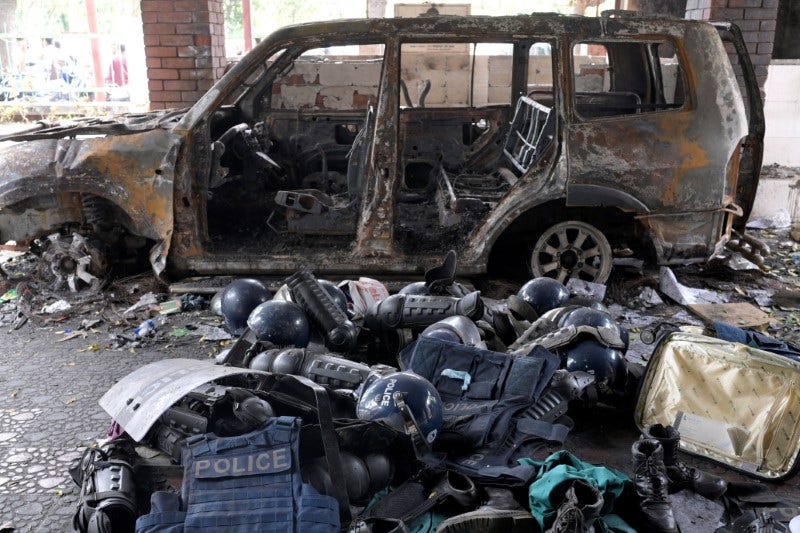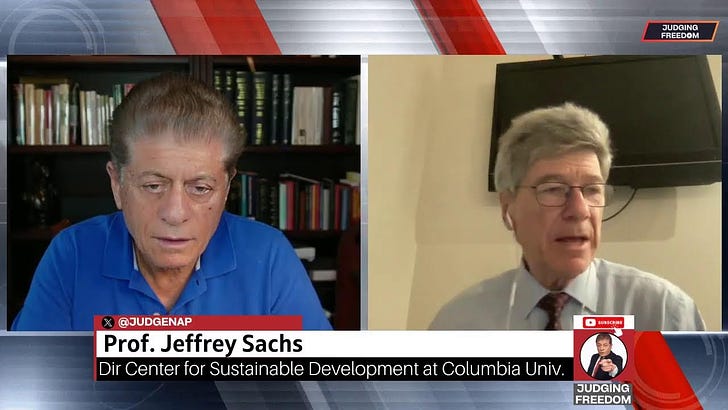There are so many examples of destabilisation by the US and regime change.
Let us not forget South Asia
Start at 20’ point
Prof. Jeffrey Sachs : US Government in Search of Enemies
Accusations of US Regime-Change Operations in Pakistan and Bangladesh Warrant UN Attention
The very strong evidence of the U.S. role in toppling the government of Imran Khan in Pakistan raises the likelihood that something similar may have occurred in Bangladesh.
Prof. Jeffrey Sachs
Two former leaders of major South Asian countries have reportedly accused the United States of covert regime change operations to topple their governments. One of the leaders, former Pakistan Prime Minister Imran Khan, languishes in prison, on a perverse conviction that proves Khan’s assertion. The other leader, former Bangladesh Prime Minister Sheik Hasina, fled to India following a violent coup in her country. Their grave accusations against the U.S., as reported in the world media, should be investigated by the UN, since if true, the U.S. actions would constitute a fundamental threat to world peace and to regional stability in South Asia.
The two cases seem to be very similar. The very strong evidence of the U.S. role in toppling the government of Imran Khan raises the likelihood that something similar may have occurred in Bangladesh.
In the case of Pakistan, Donald Lu, Assistant Secretary of State for South Asia and Central Asia, met with Asad Majeed Khan, Pakistan’s Ambassador to the U.S., on March 7, 2022. Ambassador Khan immediately wrote back to his capital, conveying Lu’s warning that PM Khan threatened U.S.-Pakistan relations because of Khan’s “aggressively neutral position” regarding Russia and Ukraine.
The Ambassador’s March 7 note (technically a diplomatic cypher) quoted Assistant Secretary Lu as follows: “I think if the no-confidence vote against the Prime Minister succeeds, all will be forgiven in Washington because the Russia visit is being looked at as a decision by the Prime Minister. Otherwise, I think it will be tough going ahead.” The very next day, members of the parliament took procedural steps to oust PM Khan.
On March 27, PM Khan brandished the cypher, and told his followers and the public that the U.S. was out to bring him down. On April 10, PM Khan was thrown out of office as the parliament acceded to the U.S. threat.
We know this in detail because of Ambassador Khan’s cypher, exposed by PM Khan and brilliantly documented by Ryan Grim of The Intercept, including the text of the cypher. Absurdly and tragically, PM Khan languishes in prison in part over espionage charges, linked to his revealing the cypher.
The U.S. appears to have played a similar role in the recent violent coup in Bangladesh. PM Hasina was ostensibly toppled by student unrest, and fled to India when the Bangladeshi military refused to prevent the protestors from storming the government offices. Yet there may well be much more to the story than meets the eye.
According to press reports in India, PM Hasina is claiming that the U.S. brought her down. Specifically, she says that the U.S. removed her from power because she refused to grant the U.S. military facilities in a region that is considered strategic for the U.S. in its “Indo-Pacific Strategy” to contain China. While these are second-hand accounts by the Indian media, they track closely several speeches and statements that Hasina has made over the past two years.
On May 17, 2024, the same Assistant Secretary Liu who played a lead role in toppling PM Khan, visited Dhaka to discuss the US Indo-Pacific Strategy among other topics. Days later, Sheikh Hasina reportedly summoned the leaders of the 14 parties of her alliance to make the startling claim that a “country of white-skinned people” was trying to bring her down, ostensibly telling the leaders that she refused to compromise her nation’s sovereignty. Like Imran Khan, PM Hasina had been pursuing a foreign policy of neutrality, including constructive relations not only with the U.S. but also with China and Russia, much to the deep consternation of the U.S. government.
To add credence to Hasina’s charges, Bangladesh had delayed signing two military agreements that the U.S. had pushed very hard since 2022, indeed by none other than the former Under-Secretary of State Victoria Nuland, the neocon hardliner with her own storied history of U.S. regime-change operations. One of the draft agreements, the General Security of Military Information Agreement (GSOMIA), would bind Bangladesh to closer military-to-military cooperation with Washington. The Government of PM Hasina was clearly not enthusiastic to sign it.
The U.S. is by far the world’s leading practitioner of regime-change operations, yet the U.S. flatly denies its role in covert regime change operations even when caught red-handed, as with Nuland’s infamous intercepted phone call in late January 2014 planning the U.S.-led regime change operation in Ukraine. It is useless to appeal to the U.S. Congress, and still less the executive branch, to investigate the claims by PM Khan and PM Hasina. Whatever the truth of the matter, they will deny and lie as necessary.
This is where the UN should step in. Covert regime change operations are blatantly illegal under international law (notably the Doctrine of Non-Intervention, as expressed for example in UN General Assembly Resolution 2625, 1970), and constitute perhaps the greatest threat to world peace, as they profoundly destabilize nations, and often lead to wars and other civil disorders. The UN should investigate and expose covert regime change operations, both in the interests of reversing them, and preventing them in the future.
The UN Security Council is of course specifically charged under Article 24 of the UN Charter with “primary responsibility for the maintenance of international peace and security.” When evidence arises that a government has been toppled through the intervention or complicity of a foreign government, the UN Security Council should investigate the claims.
In the cases of Pakistan and Bangladesh, the UN Security Council should seek the direct testimony of PM Khan and PM Hasina in order to evaluate the evidence that the U.S. played a role in the overthrow of the governments of these two leaders. Each, of course, should be protected by the UN for giving their testimony, so as to protect them from any retribution that could follow their honest presentation of the facts. Their testimony can be taken by video conference, if necessary, given the tragic ongoing incarceration of PM Khan.
The U.S. might well exercise its veto in the UN Security Council to prevent such a investigation. In that case, the UN General Assembly can take up the matter, under UN Resolution A/RES/76/, which allows the UN General Assembly to consider an issue blocked by veto in the UN Security Council. The issues at stake could then be assessed by the entire membership of the UN. The veracity of the U.S. involvement in the recent regime changes in Pakistan and Bangladesh could then be objectively analyzed and judged on the evidence, rather than on mere assertions and denials.
The U.S. engaged in at least 64 covert regime change operations during 1947-1989, according to documented research byLindsey O’Rourke, political science professor at Boston Collage, and several more that were overt (e.g. by U.S.-led war). It continues to engage in regime-change operations with shocking frequency to this day, toppling governments in all parts of the world. It is wishful thinking that the U.S. will abide by international law on its own, but it is not wishful thinking for the world community, long suffering from U.S. regime change operations, to demand their end at the United Nations.
Hindus in Bangladesh try to flee to India amid violence
By Ruma Paul and Krishna N. Das
August 9, 2024

DHAKA/NEW DELHI, Aug 8 (Reuters) - Hundreds of Bangladeshi Hindus have tried unsuccessfully to flee to India this week after many homes and businesses of the minority community were vandalised following the overthrow of Prime Minister Sheikh Hasina.
The Bangladesh Hindu Buddhist Christian Unity Council said that 45 out of 64 districts in the country had seen the targeting of mostly Hindu homes, businesses or temples this week. A school teacher had been killed and 45 other people hurt, it said.
Advertisement · Scroll to continue
Hindus make up about 8% of Muslim-majority Bangladesh's 170 million people and have traditionally largely supported Hasina's Awami League party, which identifies as largely secular, instead of the opposition bloc that includes a hardline Islamist party.
Hasina has taken refuge in India after fleeing the country on Monday in the face of mass protests against what critics called her authoritarian rule - provoking anger among some Bangladeshis towards their neighbour.
Advertisement · Scroll to continue
Many living close to India are trying to flee but facing resistance from both sides, local people said. Both countries have said they have stepped up border patrolling since the violence.
Mohammad Rakibul Hasan, a local government official in Thakurgaon district in northwestern Bangladesh, said around 700-800 Hindus tried to flee to India around Wednesday evening after some of their houses were attacked and looted.
"They returned home after we provided protection," Hasan told Reuters. "Border guard troops are patrolling the area. Everything is fine now with no further reports of violence."
Early on Thursday, about 300 Bangladeshis had assembled at a border point near India's Jalpaiguri district but dispersed later. Indian media showed Indian border troops around a group of people there.
A Hindu goldsmith in the Narsingdi area, about an hour from Dhaka, who did not want to be named for fear of reprisals, said two youths demanded protection money of 1 million Bangladesh taka ($8,550) and relented only after they agreed to pay 100,000 taka.
Nobel Peace laureate Muhammad Yunus, who returned to Bangladesh on Thursday to head an interim government following Hasina's departure, said attacks on minorities could have been part of a conspiracy. He did not say who was behind the conspiracy.
"Our job is to protect all of them," he said on arrival in Dhaka from Paris.
"If you have faith in me and trust me, please ensure no one is attacked in the country. If you cannot listen to me on this, I have no use being here."
The two countries have longstanding cultural and business ties and India played a key role in the 1971 war with Pakistan which led to the creation of Bangladesh.
India, which has a Hindu majority, has said it was worrying that minorities, their businesses and temples had been attacked in many places.
"It is the responsibility of every government to ensure the wellbeing of all its citizens," India's foreign ministry spokesperson, Randhir Jaiswal, told a press conference.
"We hope for the early restoration of law and order in Bangladesh. This is both in the interest of the country itself and the larger region."
Bangladesh's Hindu community leaders urged other communities to look after the religious minorities.
"I call upon the conscientious people of the country to forget all differences and stand unitedly by the side of the affected people and build social resistance," said Moyna Talukdar of the Bangladesh Hindu Law Reform Council.
One example of violence against Hindus in Bangladesh
Another Hindu teacher in Bangladesh has been insulted by Muslim students he once taught and was forced to resign.
Every day, thousands of Hindus in Bangladesh are being pressured to sign resignation letters. Their aim is to remove all 2.5 million Hindus working in Bangladesh


